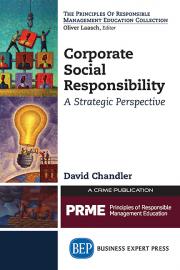“What is Strategic CSR?” by David Chandler
 I recently published a book as part of the United Nations Principles for Responsible Management Education (PRME) book collection. The book is titled Corporate Social Responsibility: A Strategic Perspective and is published by Business Expert Press.
I recently published a book as part of the United Nations Principles for Responsible Management Education (PRME) book collection. The book is titled Corporate Social Responsibility: A Strategic Perspective and is published by Business Expert Press.
The main purpose of the book is to detail the core, defining principles of strategic CSR that differentiate it from related concepts, such as CSR, sustainability, and business ethics. The foundation for the ten principles lies in a pragmatic philosophy, oriented around stakeholder theory that is designed to appeal to managers skeptical of existing definitions and organizing principles of CSR, sustainability, or business ethics. It is also designed to stimulate thought within the community of academic intellectuals committed to these ideas, but who approach them from more traditional perspectives.
I believe that strategic CSR is related to, but is fundamentally different from, concepts such as sustainability and business ethics. While sustainability focuses on resource utilization and ecological preservation, and business ethics seeks to construct normative prescriptions of right and wrong, strategic CSR is grounded in the day-to-day operations of the firm. As such, strategic CSR is central to the firm’s value creating activities.
That is, in a dynamic business environment defined by the actions and decisions of the firm’s broad set of stakeholders, value is optimized when stakeholders convey and enforce their needs, while the firm responds to those evolving needs. Thus, these economic and social exchanges are essentially interactions formed around the collective set of values prevalent in society at any given point in time. These values determine the decisions we make and, as a direct result, the success or failure of for-profit firms.
The concept of strategic CSR draws on what we know about economic exchange and human psychology to explain how markets work and how value is created. Understanding these processes allows managers to build a strategic competitive advantage for the firm. As such, strategic CSR will increasingly become central to business success in the twenty-first century.
In short, I believe that understanding, adopting, and implementing strategic CSR is the source of sustainable value creation for business in the twenty-first century.
By seeking to define strategic CSR in this way, therefore, the purpose of the book is radical—it aims to reform both business education and business practice. By building a theory that defines CSR as core to business operations and value creation (as opposed to peripheral practices that can be marginalized within the firm), these defining principles become applicable across the range of operational functions. In the process, they redefine how businesses approach each of these functions in practice, but also redefine how these subjects should be taught in business schools worldwide. As such, this book will hopefully be of value to instructors as a complement to their work, students as a guide in their education, and managers as a framework to help respond to the complex set of pressures that they face every day.
David Chandler (david.chandler@ucdenver.edu) is Assistant Professor of Management and Co-Director of the Managing for Sustainability Program at the University of Colorado Denver Business School. In addition to Corporate Social Responsibility: A Strategic Perspective, his publications include the textbook Strategic Corporate Social Responsibility: Stakeholders, Globalization, and Sustainable Value Creation (3rdedition, Sage Publications, Inc., 2014). He is also author of the blog Strategic Corporate Social Responsibility.
